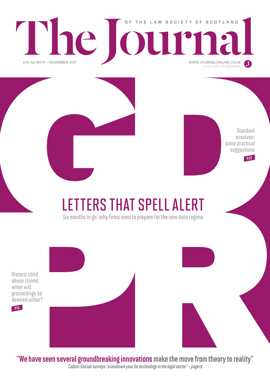Sentence, but no full stop

On the whole, when an individual is arrested, found guilty, and sentenced to prison, society breathes a sigh of relief – the perpetrator is being punished, and the community is being protected.
But what about the families that are left behind – the parents, partners, siblings and, perhaps most importantly, the estimated 20,000 children in Scotland each year who have a parent in prison?
They are innocent, but are often treated as though they are guilty. They feel stigma, rejection, victimisation, and rarely know who to turn to for support.
Families Outside is the only charity in Scotland to work exclusively on behalf of families affected by imprisonment. They speak to thousands of families each year, providing information and support on issues such as housing, finance, anxiety and depression.
However, due to the stigma associated with imprisonment, and a lack of awareness and trust to certain agencies, families are often very difficult to reach.
Families Outside is already working with Police Scotland, Social Work Scotland, the Scottish Court Service and numerous other organisations that come into contact with families affected by imprisonment, but still earlier intervention is required.
According to chief executive Nancy Loucks, “Families are often described as ‘hidden victims’; they need support but are often too ashamed to seek it actively. At Families Outside, we support over 2,000 families each year, and one of the most common comments we hear is, ‘I wish I had known about you earlier.’ Earlier intervention often means we can solve issues before they escalate.”
And when earlier than at the point of remand or sentence?
In 2015-16 there were 116,800 proceedings in Scottish courts, which led to 99,950 convictions. Of that total, and not including the high number of people remanded into custody, 13,735 people were sentenced to prison – people who have families outside, families that need support.
When your case ends with custody, give your clients’ families some hope and tell them to contact Families Outside on 0800 254 0088.
Case study: “If only I’d known about you...”
Pete and Jane have two young children. They live in a home where Pete is the main carer and earner. In July 2016, Pete was sentenced to three years in prison.
Shunned by her community, friends and family, Jane struggled to balance work and family life. She started to get into debt, her physical health deteriorated and she began to suffer from anxiety and depression.
As Jane’s mental health declined, her family became more and more affected, especially her eldest son John, aged seven, who began to show challenging behaviour at home and at school.
At this point Jane was not aware of what support was available to her and her family. She had accrued a substantial amount of debt and was so affected by her depression that she rarely left the house. It was only through the prison’s Family Contact team that she was made aware of and referred to Families Outside.
The charity worked directly with her to understand her specific support needs, creating an action plan that would help her and the rest of the family. This included meeting with John’s school to inform them of the family’s new situation. Despite Jane’s initial reluctance, the meeting was extremely productive and resulted in both the teachers and Jane monitoring John’s behaviour and working together to improve it.
Families Outside’s regional support coordinator also held 1:1 sessions with John, giving him time and space to talk about his concerns, fears and feelings. According to Jane, “The kids have had a lot of support from the school and from Families Outside. They are happy again, so I’m happy again.”
As the children’s behaviour improved, so did Jane’s confidence. Families Outside continued to work closely with her, encouraging her to speak to her GP about her health issues, enrolling her on money management courses and identifying organisations such as Sacro, which can provide transport for prison visits.
Jane also attended a parenting programme and peer support sessions run by Families Outside and Fife Council. These sessions reduced her feelings of isolation and increased her confidence and resilience.
Jane is now able to manage her finances more efficiently, she is balancing her work and family life more effectively, and both her physical and mental health have improved. Her children are both happier and are performing well at school. Families Outside continues to work with the family as they prepare for Pete’s release.
As Jane explains, “My situation spiralled out of control; I felt isolated and alone. It was only thanks to Families Outside that I was able to get a handle on my situation – if only I’d known about them earlier, my situation might not have gone so out of control.”
In this issue
- Immigration detention: a case of overuse
- Sexual harassment: don't suffer in silence
- Child disputes: a quicker way through?
- Brexit: where are we now and what happens next?
- Reading for pleasure
- Opinion: Claire McKee
- Book reviews
- Profile
- President's column
- ScotLIS: the citizens' tool
- People on the move
- People matter
- Historic abuse: the fairness matrix
- Landmark year in legal IT
- Sentence, but no full stop
- Opening up arbitration
- Making the agent pay
- Equal pay: beware the mass claims
- Dealing with conflict
- Claims outside the rules
- Pension transfers – history repeating itself?
- Last instructions
- Scottish Solicitors' Discipline Tribunal
- Standard missives: an unachievable dream?
- SOLAR powered
- Disability rights
- Law reform roundup
- Too hard a drive?
- Settlement: can you avoid cheques?
- Q & A corner
- When 25 is the new 35
- Sorry; not sorry
- Ask Ash
- Plan sets ambitious 2017-18 targets
- Letting agents: prepare to register
- Paralegal pointers
- A way to make an impact






